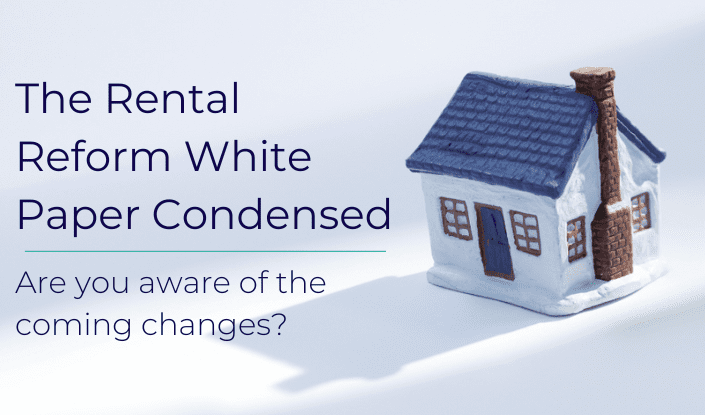As you may be aware, the widely anticipated Rental Reform White Paper “A Fairer Private Rented Sector” was released on the 16th of June 2022 and with it comes changes that will undoubtedly change some aspects of the sector.
The Bill
The bill proposes changes to tenancy agreements, grounds for eviction and repossession, and the obligations of landlords.
This white paper will be submitted to the House of Commons through a Renters Reform Bill.
It aims to significantly improve the quality of rental properties in the UK.
It clearly outlines how the quality of rental accommodation is poorer than it should be as tenants fail to report issues for fear of eviction under Section 21 ‘No-fault’ eviction.
As a result – over 2.8 million tenants live in properties that aren’t suitable by today’s standards in the UK.
The Outlawing of Section 21 ‘No Fault’ Evictions
The much-expected abolition of the ‘No Fault’ eviction under Section 21 of the Housing Act 1988 has been widely debated since its inclusion in the government’s manifesto.
Landlords will not be able to conduct evictions under section 21, and so can only conduct repossessions under certain circumstances.
The desired outcome from this change is that tenants will have the confidence to report any issues that require maintenance, without the possibility of being evicted.
Though the government’s intentions are to stop no-fault evictions, there are circumstances where a landlord can seek eviction through no fault of the tenant.
Situations where landlords can repossess their property are:
- When selling the property
- When moving ‘close’ family members into the property
- When moving into the property for themselves
In order for landlords to maintain their ability to repossess, the grounds for repossession under section 8 have been strengthened so that when repossession is necessary, landlords still have the ability and jurisdiction to do so.
It is hoped that the dynamic between tenant and landlord is one that will become more balanced and less one-sided.
A landlord will not, however, be able to seek repossession under these grounds for the first 6 months of a tenancy, similar to the current Section 21 protocol.
The government also plans to allow landlords to seek eviction in the case of ‘persistent rent arrears’, where landlords can pursue repossession in situations where tenants have fallen into two or more months of rent arrears three times in the past three years.
These changes mean that tenant referencing will be more important as it will not be as easy to repossess the property if a landlord is not content with the tenancy.
Restrictions on Rent Increases
The white paper reveals plans to prevent landlords from raising a tenant’s rent unjustifiably or locking tenants into ‘automatic rent increases that are vague or may not reflect changes in the market price’.
The objective of these changes is that tenants feel that they can “challenge unjustified rent increases through the First-tier Tribunal”.
The assistance and counsel of a letting agent can inform a landlord on when is best to raise rent, and by how much.
Minimum Housing Standard
The Decent Homes Standard only applies to properties in the social housing sector, but the white paper proposes to expand its reach and enforcement into the private rental sector.
This will ensure that a certain level of quality of a property must be met before being let out, it also ensures that properties in a poorer condition can be given attention sooner and do not have to wait for a tenant to report it.
This was also proposed for health and safety reasons so that hazards like fire, carbon monoxide, and fall risks can be detected and or prevented.
New Landlord Ombudsman
A new obligatory private landlord ombudsman will be introduced and will have newfound, and more impactful powers that can operate regardless of whether a property is let with an agent or not, this new ombudsman will compel landlords to:
- Take mandated remedial actions
- Pay compensation of up to £25,000
- Provide tenants or the ombudsman with certain information
- Issue an apology to their tenants
The decision that the ombudsman makes will be put upon the landlord if the complaint is approved.
Landlords who fail to heed the decision of the ombudsman can be fined, with serial offenders potentially facing banning orders.
Banning of Certain Blanket Bans
The government plans to illegalise the issuing of blanket bans by landlords on:
- Families with children
- Those who receive Universal Credits
Further Rights for Pet-Owning Tenants
Similarly, to bans on certain blanket bans, the white paper states have made changes to the outright banning of tenant pet ownership.
A tenant can request to have a pet and the landlord cannot unreasonably reject – and the tenant can challenge a landlord if they feel they are being unjust.
To counteract this, the landlord can request that the tenant take out pet insurance on account of the increased risk of potential damage.
More Consideration of Tenant Requests
In accordance with the tenant being given more opportunities to challenge landlord decisions; The government advises landlords to allow and consider requests from tenants to change, personalise or alter the property.
Changes such as: replacing appliances, hanging pictures and redecorating, as long as they make efforts to revert the property to its original state at the end of their tenancy.
Though this is not legislation, it goes alongside the government’s plans to make rental properties more accommodating to a tenant’s needs.
By reading these proposed changes in legislation, and the objectives and aspirations of their implementation, the government aims to make the position of a tenant much less volatile and more sustainable for long-term living.
Letting agents can be liaised with to discuss any concerns or changes you wish to make. With the changes coming to the PRS, is now the time to switch managing agents?
View our management packages and see what we can offer you.


